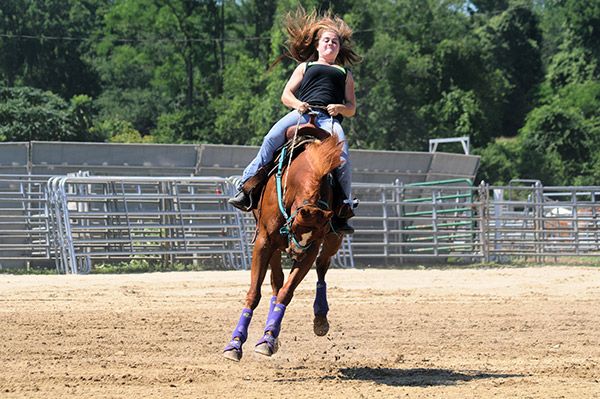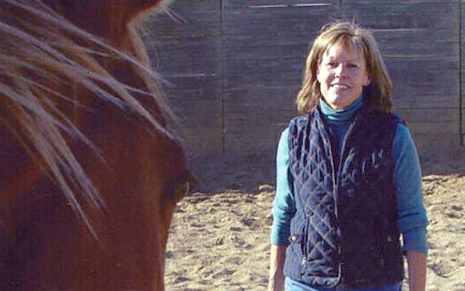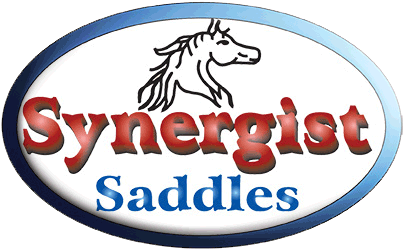By Mary D. Midkiff
Let’s face it: riding horses is risky business. It takes courage, desire, coordination and balance just to mount a horse, much less direct him through his paces. It is no wonder that riders can easily lose their confidence when something goes wrong. It doesn’t take much to create an environment of fear, distrust and doubt when it comes to managing a horse under saddle.
 Every rider, whether novice or advanced, has experienced fear, instability, self-doubt, lack of trust and insecurity as a part of being around and/or riding horses. Everyone knows the dangerous aspects of horses due to their size, weight, natural instincts of flight or fight and self-preservation. Since we know that horses can be unpredictable, we also know that accidents can happen.
Every rider, whether novice or advanced, has experienced fear, instability, self-doubt, lack of trust and insecurity as a part of being around and/or riding horses. Everyone knows the dangerous aspects of horses due to their size, weight, natural instincts of flight or fight and self-preservation. Since we know that horses can be unpredictable, we also know that accidents can happen.
Sometimes we can go through an incident with a horse and come out better for it – more experienced and prepared for the next time. Other times, the incident may have a lasting effect and shaking our confidence and capability.
Lack of confidence can show up in a great many areas of our riding and our lives. Having these sensations of insecurity inside you while you are riding can limit effectiveness, cause you to think twice about riding itself, send mixed messages to your horse, and become exhausting. It can infuse your daily life with a sense of uneasiness, limiting your experiences in the riding you so love and want to pursue.
Confidence is not only tied up with the fear of getting injured. It can also be heavily involved with the need to look good and in control. We certainly don’t want to fall off and get injured, but we also don’t want to look bad, or embarrassed, or experience a loss of power in front of others, suggesting that we have lost control of the horse and the situation.
When an incident occurs, it is a surprise – something you have never experienced before. From then on we typically feel the fear of it (or something similar) happening again. The sense of fear when it was happening, multiplied by replaying the event in your mind, keeps you powerless and insecure. You can lose trust in yourself, your abilities and your capacity for managing a horse.
When riders comes to me with confidence issues, in any measurable amount, I make an assessment of the person and the situation. I try to find out what happened to sway their trust in themselves and their horse, and ask them if they ever truthfully felt genuinely confident on a horse to begin with.
Many times I learn that there was always an insecurity associated with riding that made it impossible to ride in a manner characterized by safety, comfort, effectiveness and balance on a horse’s back.
The carefree days of children learning to ride on the farm with their grandfather’s big old draft horse have become few and far between, as are the days when kids grew up jumping on the family pony bareback with a halter and rope and galloping across open fields. These youngsters learned naturally to feel free and confident even at full speed. They developed balance and coordination by just doing it.
Most children and adults today learn to ride in an urban setting in a supervised lesson program once per week on school horses. Depending on the quality of the instructors and their awareness of the needs of beginner riders, this may not be an environment that nurtures confidence in one’s ability.
Many such riders start losing confidence early on when a horse or pony does not match their level of learning; the saddle does not fit their body and throws them off balance; they do not have a fitness program supporting their riding; they are taught to grip with their knees and sit in a posture that does not work; or the basic alignment of their spine and pelvis compromises their safety and puts them at risk.
The first time they feel precarious, lose their balance and are unseated or fall off can be the one time that plants a seed of fear that shakes their confidence and trust in riding. This seed will grow over time as additional incidents reinforce that lack of confidence, producing timid or fearful riders that horses detect and react to accordingly.
 Shaking a deep-seated fear is not easy. The mental, emotional and physical sensations related to fear can become powerful, unconscious and involuntary in establishing a hold over us. It can gnaw at your gut so that even at the thought of getting on a horse triggers a host of negative sensations and responses. My approach to helping riders back to full capacity usually involves building a plan of action.
Shaking a deep-seated fear is not easy. The mental, emotional and physical sensations related to fear can become powerful, unconscious and involuntary in establishing a hold over us. It can gnaw at your gut so that even at the thought of getting on a horse triggers a host of negative sensations and responses. My approach to helping riders back to full capacity usually involves building a plan of action.
Next month Part 2: How to create a personalized plan to rebuild rider confidence
Mary D. Midkiff is an author, horse trainer and riding instructor. She is also the creator and founder of the Women & Horses fitness and performance program.

Comments 1
I’ve had a serious accident in my youth . Now 62 owning 5 horses and with a few health issues haven’t ridden in a while. I used to call myself a rider, now I feel like I’m just the keeper of the horses. I was called the crazy lady who likes to ride the wild horses as the spunkier the horse was the more fun I thought I was having. Now I have what I call a healthy fear but in addition unless I ride regularly it’s difficult to not have more fear than fun now when I ride. I’d ridden for years as a good ride by the seat of my pants. Then in my 20’s took some English lessons and realized I didn’t know how to ride. Anyways I relate to everything you’re saying. Glad there are instructors becoming more aware of the need for acknowledgment on the subject of fear